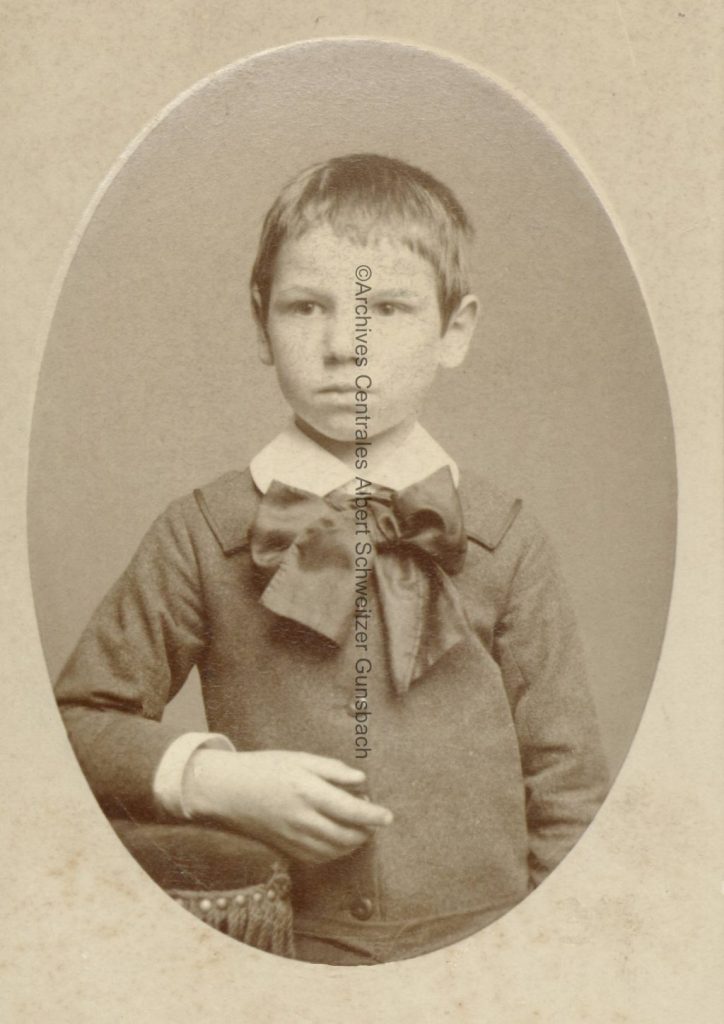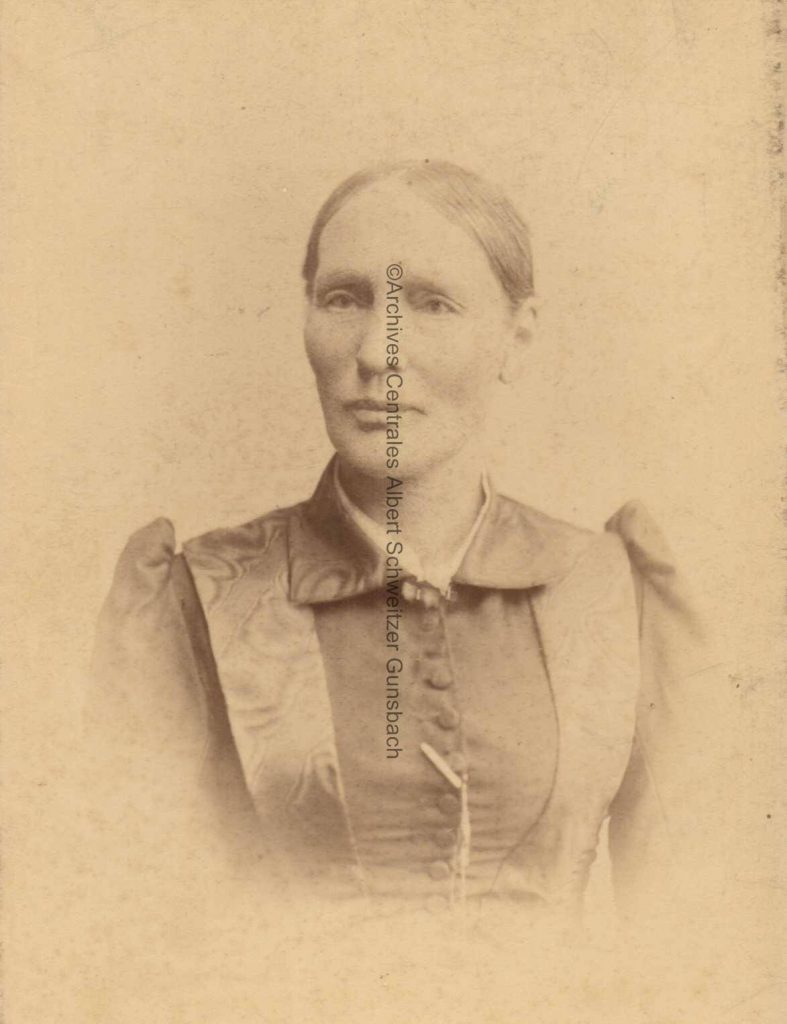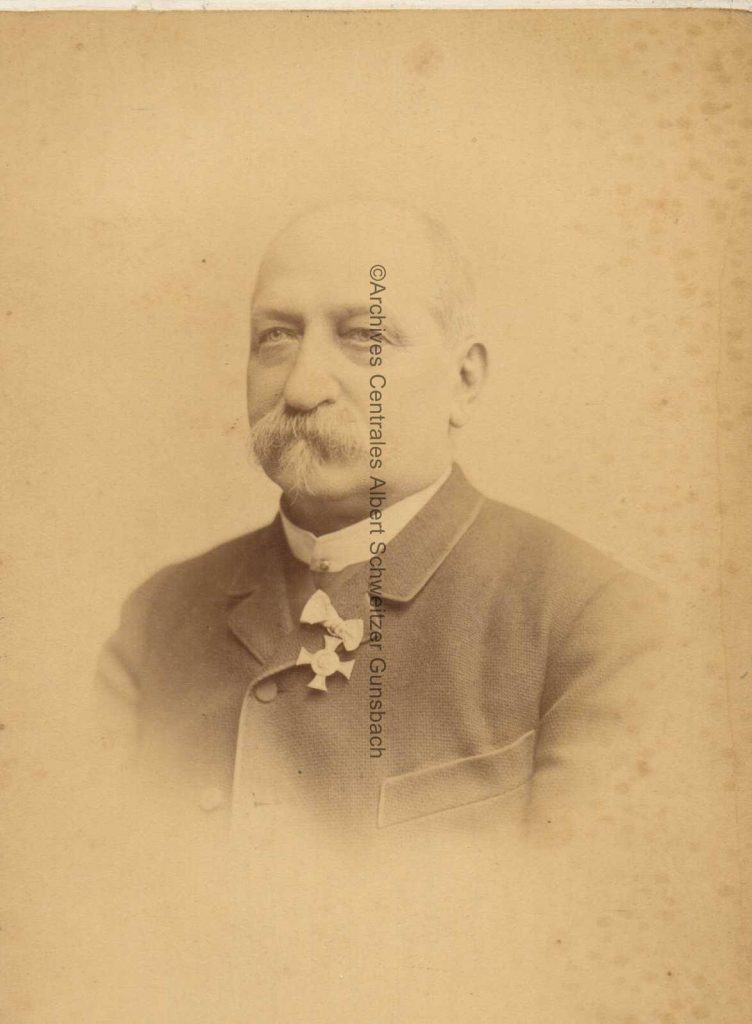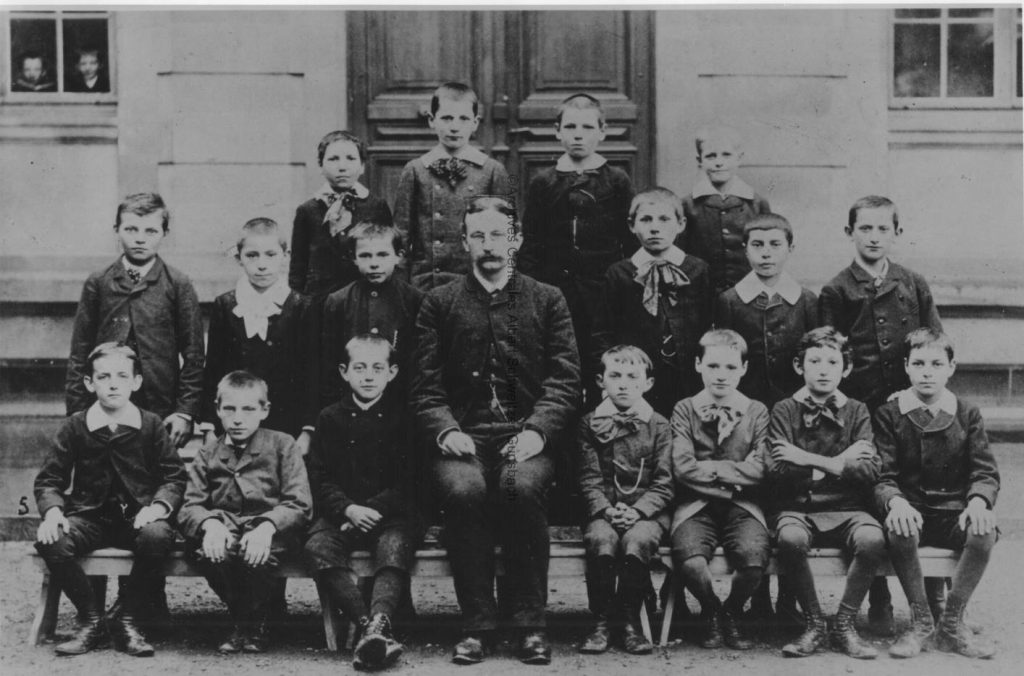1875-1893: Albert Schweitzer’s childhood in Gunsbach and Mulhouse
July 1875: The Schweitzer family moves to Gunsbach: parents Louis and Adèle, and Louise and Albert. Four more children would brighten up the household: Adèle, Marguerite, Emma and Paul.
During his childhood, Albert Schweitzer remembered each event as a lesson in life: “My youth was particularly happy […] I felt crushed under the weight of this happiness, and I wondered if I had the right to accept this gift as natural. […] I felt crushed under the weight of this happiness, and I wondered if I had the right to accept this gift as natural. (Memoirs of Childhood and Youth)
A precocious and discreet child, he was out of step with those closest to him.
His sensitivity gave him an unusual outlook for a child his age. Nature was his world, and would remain so for the rest of his life. His poetic descriptions of nature would often be found much later in his writings and correspondence.
He described himself as passionate, respectful of others, lazy, dreamy, thoughtful and sensitive. He said he inherited his shyness and withdrawn nature from his mother. He owes his liveliness of temperament to his father.
When I was 5, every Sunday in the old presbytery, I put a penny in my piggy bank for the missions. It was one of my earliest childhood memories. It was a very solemn moment.
Memoirs of Childhood and Youth
This anecdote and, a few years later, his trips to the Champ de Mars park in Colmar, to see Bartholdi’s Bruat monument, were already foreshadowing his African vocation.

A quiet, dreamy student
His report card from Gunsbach school, aged 5 to 9, reads: “Silent and dreamy pupil. Learnt to read and write without enthusiasm”.
At the age of 7: “Proves capable of playing hymns on the harmonium with his own accompaniment”. At the age of9, Father Iltis, his teacher and organist at the church in Gunsbach, noted: “Able to replace me on the organ during worship!
Albert, the pastor’s son, the son of a nobleman, “a petit bourgeois“, or “little gentleman” as he put it. It was a very different world from that of his friends, an idea he rejected with all his being: “At school, I had already felt troubled when I discovered the sad family environment of some of my friends and compared it to the almost ideal life of our home in Gunsbach” (Memoirs of Childhood and Youth). Albert Schweitzer, not without pain, wanted to be like his friends: clogs during the week, but shoes on Sundays, a cap like that of the village boys, and above all: no coat, as his friends didn’t have any.
“At the age of nine, I was sent to the school in Munster, so that morning and evening I had to walk three kilometres at the foot of the mountain”. (Memoirs of Childhood and Youth). For him, this journey, every day, in all weathers, was “an immense pleasure to be in nature“. At school in Munster, he was described as “a shy, reserved pupil who liked solitude“. But even at this age, he was already interested in politics and contemporary events.
When, in 1885, it was decided to send me to the lycée in Mulhouse, in Upper Alsace, I shed secret tears for hours. It seemed to me that I was being separated from nature.
Memoirs of Childhood and Youth
Uncle Louis and Aunt Sophie
He went to stay with Uncle Louis and Aunt Sophie, an elderly couple with no children, who also took in Miss Anna Schaeffer, the daughter of the pastor of Munster and a teacher at the Ecole Supérieure des Jeunes Filles, who, according to Albert Schweitzer, helped to educate him. Uncle Louis was head of primary schools in Mulhouse and Aunt Sophie was a teacher: “In my uncle’s house, my life was regulated down to the smallest detail. After lunch, I had to practise the piano until I left for the lycée; in the evening, when I’d finished my homework, I’d go back to the piano. “You don’t know whether, one day, music won’t be very useful to you,” my aunt used to say to me every time she took me back to my instrument, almost by force.” (Memoirs of Childhood and Youth)


Just as young Albert would walk into his father’s study and say: “the smell of books filling it took my breath away”, it was in this new family that he developed a taste for reading and “devouring books”: “I can’t bring myself to leave a book I’ve started; I prefer to spend the night reading it, or at least going through it to the end. If I like the book, I reread it two or three times.” (Memoirs of Childhood and Youth).
The first years in Mulhouse proved difficult.
In 1887, Albert was 12 years old. He was considered to be too much of a dreamer, and even considered dropping out of school. His refuge in his dreams was much more sadness. But his attentive Aunt Sophie saw through him and took care of this uprooted little boy.
At the beginning of my stay in Mulhouse, I suffered greatly from being separated from nature. One sunny day in March, when the snow was melting, I was sitting after tea at the table where I usually did my homework, while my nostalgic eyes wandered off into the distance. […] For the first few years of my stay in Mulhouse, I was intensely nostalgic for the church in Gunsbach! It was a painful deprivation not to hear my father’s sermons any more, not to feel the atmosphere of that simple worship to which I had been accustomed since childhood. My father’s sermons made a deep impression on me. I realised how much effort and even struggle it took him to give his inner self to his audience every Sunday. I remember vividly some of his sermons that I heard as a child.
Memoirs of Childhood and Youth

Student keenly interested in history
At the lycée, the arrival of a new teacher, Mr Wehmann, turns young Albert’s life upside down. As proof of this, his school report states: “Pupil with a keen interest in history”. In the natural sciences: “A penetrating mind which is not content with descriptions of natural phenomena, but which, more profoundly, looks to see if there is a true explanation for the problems of life in its various aspects”. But especially in literature: “The pupil rebels against the explanations given by the teacher, explanations which he sees as chatter that destroys the emotion aroused by the poet’s work”. (Robert Delahaye, Principal of the Lycée de Munster, Annuaire Société d’Histoire de Munster 1965) Here we can already see his concern for the essential, which he applied throughout his life, in theology as much as in medicine.
Around the age of 14, Albert Schweitzer took piano and organ lessons with Eugène Munch. At 16, Albert replaced Eugène Munch at church services. At 17, in Mulhouse, he gave his first public concert: Brahms’s Requiem.
In 1893, Albert was admitted to the baccalaureate with a commendable mark and appreciation in history. This confirmed his interest in history and foreshadowed the direction he would take in his approach to theology.
Uncle Louis, Aunt Sophie, Mr Wehmann, Eugène Munch and many others, mentioned in his Memoirs of Childhood and Youth, helped to give Albert his optimistic vision of the future: “Doubting nothing, I resolved to pursue theology, philosophy and music at the same time” (Memoirs of Childhood and Youth). Another life was about to begin.
Alain SCHUMACHER